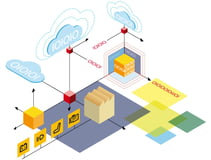Why Your Customers Can't Wait for Industry 4.0
Brian Hoey - July 17, 2018

 As experts tout the possibilities of Industry 4.0 for reshaping the world of manufacturing, it’s quickly becoming clear that the changes and paradigm shifts will not be limited to the factories in which they originate. Shipping, logistics, and commerce in general will all feel the effects of the fourth industrial revolution in numerous ways, some predictable and some not. One thing that Industry 4.0 has rapidly made clear, however, is that the age old distinction between providers of goods and providers of services is little more than an elaborate fiction. Even if you’re an OEM providing smaller parts for other business’s production streams, in the modern era you’re still essentially a service provider, offering delivery of parts at the agreed upon time and support throughout the parts’ life cycles in order to facilitate an ongoing relationship that bolsters existing production cycles.
As experts tout the possibilities of Industry 4.0 for reshaping the world of manufacturing, it’s quickly becoming clear that the changes and paradigm shifts will not be limited to the factories in which they originate. Shipping, logistics, and commerce in general will all feel the effects of the fourth industrial revolution in numerous ways, some predictable and some not. One thing that Industry 4.0 has rapidly made clear, however, is that the age old distinction between providers of goods and providers of services is little more than an elaborate fiction. Even if you’re an OEM providing smaller parts for other business’s production streams, in the modern era you’re still essentially a service provider, offering delivery of parts at the agreed upon time and support throughout the parts’ life cycles in order to facilitate an ongoing relationship that bolsters existing production cycles.
It's debatable whether this has always been true and is being brought to light by the rise of Industry 4.0, or whether this is one of many fundamental changes that many industries are going through in an era of increased digitization and digital sophistication. The result, however, is the same either way: your relationship with your customers will evolve into something that resembles the relationship between customers and service providers—and if you embrace this evolution, your customers will thank you for it.
Exceeding Delivery Expectations
The rise of just in time delivery has been putting increased pressure on transport logistics for years now, but the continued growth of Amazon (and Amazon Prime in particular) has radically increased the pressure that businesses feel to provide highly transparent and flexible delivery timetables. This added pressure is built into the mindsets of, for instance, Prime customers who think of simplified delivery as something that their subscription fee pays for. Luckily, Industry 4.0 is making it easier than ever for businesses that adopt its frameworks to meet this pressure head on. The improvements in efficiency and lean supply chain management that arise in Industry 4.0 settings can help to shorten lead times, yielding quicker delivery turnarounds, while the integration of smart sensors, internet of things (IoT) devices, and RFID chips into the value stream can make real time order tracking possible.
Not only will your customers appreciate the added degree of transparency that comes from being able to receive up-to-the-minute updates on their orders, but they'll also be more willing to place their trust in you going forward. If you’re selling to other businesses rather than consumers, this will also present opportunities for inter-operational IT integration, which can be a huge mutual value-added proposition.
Better Engagement Through Analytics
In addition to increased transparency, Industry 4.0 will bring about a significant uptick in the use of advanced analytics for improved forecasts and for prescriptive insights into the supply chain. It’s via these workflows in particular that the concept of every business as a service provider gains even more traction. With more accurate forecasts and predictions, for instance, it’s possible to gain a clear enough picture of future demand that you rarely sell out of a part or item that your customers need or want. The end result here is a smoother supply stream that not only builds in predictability and stability for your customers, but reduces the number of bottlenecks and shortages that require an operational response, thereby saving your business time and money.
As analytics processes become even more sophisticated, they can also begin to power never before seen workflows aimed at improving customer experience. For example, some companies are now rolling out automated chat bots that can assist customers with customer service issues and help them navigate important resources. In this way, Industry 4.0 is helping to create an environment in which customers are spared the interminable wait times at remote call centers that have become so dreaded across various industries. Instead, customers will be able to resolve their issues in a timely manner, using resources that are actually more efficient from a business perspective.
An Improved Environment for Product Customization
Though decreased outages and improved customer service will radically change customer experience in the Industry 4.0 era, perhaps the most touted change to the relationship between modern manufacturers and their buyers is emerging in the form of increased product customization. With the simultaneous rise of technologies like 3D printing and sophisticated planning software, many factories are now well equipped to rapidly prototype new concepts or to create small production runs of custom-designed products.
Here, advanced analytics can play an even greater role by helping manufacturers to integrate increasing customization into existing production workflows. Not only can a fully Industry 4.0-equipped facility exercise a high degree of production control in these situations, it can also rapidly adapt its production schedules as new, custom orders come in. By the same token, advanced analytics workflows can predict the need for spare parts in advance, ensuring that your customers are able to respond in agile manner to any breakdowns they may encounter. In this way, your business can continue to operate as a trusted partner and service provider for your customers long after their initial purchase.
LATEST POSTS
- Understand Why Production Planning Needs Specialized Solutions
- Understand Circular Economy in The Manufacturing Industry
- How Can Industry 4.0 IT Integration Be Achieved Smoothly?
- The Significance of Order Sequencing in Discrete Manufacturing
- How to improve your Supply Chain Management: The Power of Control Towers



